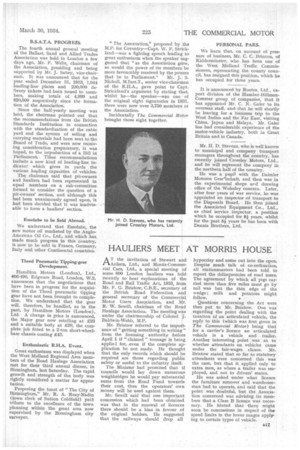HAULIERS MEET AT MORRIS HOUSE
Page 23

If you've noticed an error in this article please click here to report it so we can fix it.
AT the invitation of Stewart and Ardern, Ltd., and Morris-Commercial Cars, Ltd., a special meeting of some 800 London hauliers was held recently to hear explanations of the Road and Rail Traffic Act, 1933, from Mr. F. G. Bristow, C-BE., secretary of the British Road Federation and general secretary of the Commercial Motor Users Assqciation, and Mr. R. W. Sewill, chairman of the Road Haulage Association. The meeting was under the chairmanship of Colonel J. Baldwin-Webb, M.P.
Mr. Bristow referred to the importance of "getting something in writing" from the licensing authority !before April 1 if " claimed " tonnage is being applied for, even if the complete application be not ready. He thought that the only records which should be required are those regarding public safety or useful to the industry itself.
The Minister had promised that if councils would lay down numerous weighbridges he would pay substantial sums from the Road Fund towards their cost, thus the operators' own money will be used against them.
Mr. Sewill said that one important concession which had been obtained was that in the renewal of licences there should be a bias in favour of the original holders. He suggested that the railways should drop all
hypocrisy and come out into the open. Despite much talk of co-ordination, all stationmasters had been told to report the delinquencies of road users. The agreement by which all pigs carried more than five miles must go by rail was but the thin edge of the wedge, milk and potatoes might follow. •
Questions concerning the Act were then put to Mr. Bristow. One was regarding the point dealing with the taxation of an articulated vehicle, the reply to this (which was first given in The Commercial Motor) being that for a carrier's licence an articulated vehicle is a vehicle and trailer. Another interesting point was as to whether attendants on vehicles came under the fair-wages clause. Mr. Bristow stated that so far as statutory attendants were concerned this was the case, but that it applied only to extra men, as where a trailer was employed, and not to drivers' mates.
He was asked under what licence the furniture remover and warehouseman had to operate, and said that the point was doubtful, but the Association concerned was advising, its members that a Class B licence was necessary. He hinted that there might soon be concessions in respect of the speed limits in the lower ranges applying to certain types of vehicle.












































































